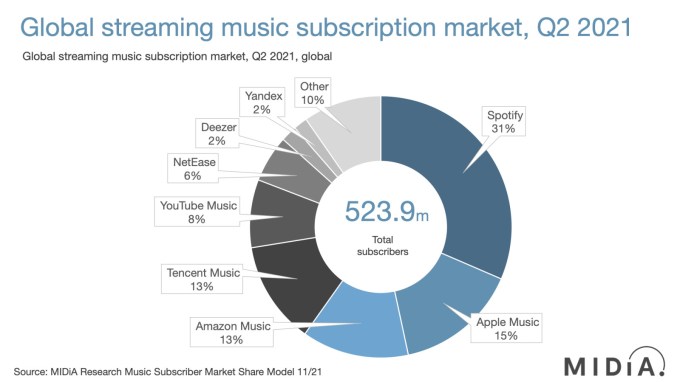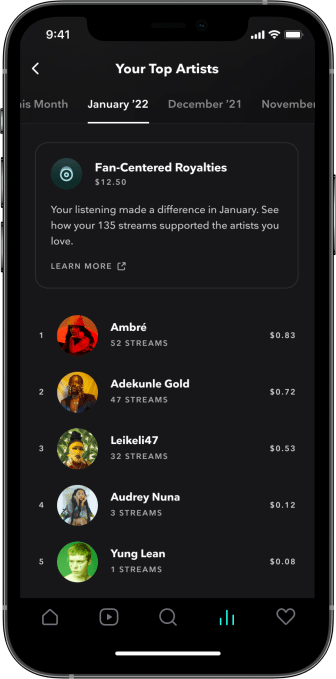Music streaming is continuing to grow around the world. According to a new report from MIDiA, an entertainment research firm, 523.9 million people subscribed to a music streaming service globally as of the second quarter of 2021. This marks a 109.5 million (26.4%) increase since the previous year.
Though Spotify remains the most-subscribed streaming service, owning 31% of the market, its dominance is very slowly decreasing — it held 33% of the market in 2020, and 34% in 2019. Spotify added more total subscribers in the year leading up to Q2 2021 than its competitors, but while Spotify grew by 20%, Amazon Music grew by 25%. Meanwhile, Google’s YouTube Music grew by more than 50% over the year leading up to Q2 2021, making it the only Western streamer to have increased its overall share of the global market. The Chinese gaming giant Tencent, which operates Tencent Music, owns the same percent market share as Amazon Music.

Image Credits: MIDiA
The market share of Amazon Music and Apple Music may continue to grow — because this report only covers up to Q2 2021, it won’t show the impact of lossless audio coming to both Amazon and Apple in May. Nearly a year ago, Spotify teased that it would launch a high-end subscription called Spotify Hi-Fi, which would give subscribers their music in a “CD-quality, lossless audio format.” But Spotify still hasn’t said when this product might become available.
And then there’s Tidal, which has historically targeted consumers who seek a higher-quality audio experience. Though Tidal’s lossless audio tier is $9.99 per month — the same cost as Apple Music, and just two dollars a month more than Amazon Music — Tidal owns less than 2% of global market share, according to MIDiA’s report. Founded by Jay-Z and later acquired by Block, Tidal markets itself as a service that helps artists share their music “precisely as the artist intended” (i.e. with extremely good audio quality).

Image Credits: Tidal
But under Block’s ownership, the idea of an artist-friendly streaming service isn’t just about sound — now, the company is experimenting with ways to make music streaming more profitable for artists. At the start of this year, Tidal introduced fan-centered royalties to its top HiFi Plus tier ($19.99/month), which means that 10% of a user’s subscription will go directly to their most-listened-to artists.
Will this move help Tidal earn new subscribers who care about paying artists more than master-quality audio? It’s a worthy try — after all, the user-centric payment streamer Deezer has a full 2% of the pie, which is more than Tidal.
Powered by WPeMatico





